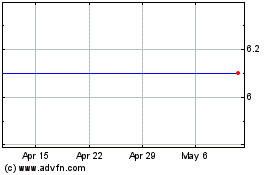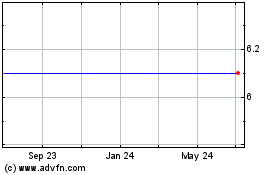Portugal's Central Bank Backs Novo Banco Cash Injection
December 30 2015 - 8:50AM
Dow Jones News
MADRID—Portugal's central bank has approved a €1.99 billion
($2.18 billion) capital injection into Novo Banco SA to come from
creditors, a move that represents the first time senior bondholders
are forced to fund a banking bailout in the country.
The Bank of Portugal said late Tuesday that it will be the last
injection of funds into Novo Banco, the lender created out of the
failed Banco Espí rito Santo SA last year, adding that the
country's government will try again to sell Novo Banco in January.
The lender had already received a €4.9 billion from a
government-run resolution fund.
The injection will be funded by senior bonds issued by Banco
Espí rito Santo to institutional investors, all of whom had to put
up at least €100,000 each to secure bonds, the central bank said.
This way, Portugal will abide by new European Union regulations
that impose losses on senior debtholders in banking bailouts.
The bonds, which were until now backed by Novo Banco's assets,
will be transferred back to Espí rito Santo. The central bank said
it would request that the ECB strips Espí rito Santo from its
banking license, which will kick off the bank's liquidation,
effectively wiping out the senior bondholders.
"These decisions will allow Novo Banco to focus on the
implementation of its business plan," the Bank of Portugal
said.
Portuguese authorities failed to find a buyer this year for Novo
Banco, which kept Banco Espí rito Santo's "good assets" such as
loans and credit. Under a plan agreed with the EU, Novo Banco was
supposed to be sold within two years, but the European Central Bank
in November said the lender needed at least €1.4 billion worth of
additional funds.
The sale of Novo Banco should put an end to a troubled chapter
for the Portuguese financial sector, which was shaken by the
collapse of Banco Espí rito Santo just as the country was emerging
from a deep recession.
Restructuring the financial sector marks the first serious test
for a new leftist governing coalition that took power in Portugal
in recent weeks. The coalition showed its first cracks last week
after the Communist Party said it would vote against a new version
of the 2015 budget that had to be revised to include a large cash
injection into Banco Internacional do Funchal SA, or Banif, a
lender that failed over the previous weekend.
The new government was forced to present a modified budget to
include €2.26 billion the state will have to inject into the
lender. Banif was broken up and mostly sold to Spain's Banco
Santander SA after authorities deemed it was no longer viable.
Novo Banco reported a €251.9 million loss for the first half of
this year after setting aside money to cover souring loans. Credit
at risk of default rose to 20% of total lending compared with about
17% in December. Deposits, however, are growing. It also has a
roughly 18% share of Portugal's banking market, which makes it a
rare prey for investors seeking to enter the European financial
system.
Carla Canivete in Lisbon contributed to this article.
Write to David Romá n at david.roman@wsj.com
(END) Dow Jones Newswires
December 30, 2015 08:35 ET (13:35 GMT)
Copyright (c) 2015 Dow Jones & Company, Inc.
Banco Santander (NYSE:STD)
Historical Stock Chart
From Mar 2024 to Apr 2024

Banco Santander (NYSE:STD)
Historical Stock Chart
From Apr 2023 to Apr 2024
